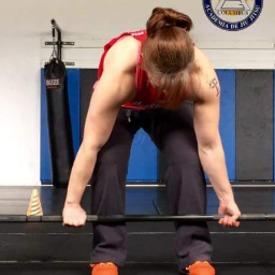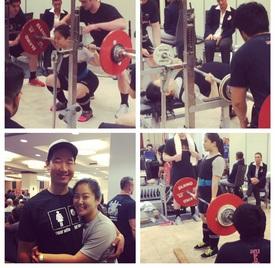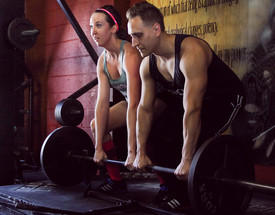What is considered HEAVY LIFTING?

Juliedungca
Posts: 22 Member
I go to a core boot camp 4 days a week, Monday through Thursday, which is a mix of cardio, resistance training and weights for 45 minutes in quick intervals. When we work in weights, its far more about reps than weight. Our trainers like to keep us MOVING. I am rarely sore the day after a class, SOMETIMES a little stiff.
I want to start doing "heavy lifting" like squats, deadlifts, bench presses, etc. In addition to eating more, I've read I should lift heave 2-3 times a week, letting my muscles repair and build in between.
Will my boot camp interfere with this process? I was hoping to lift on Friday, rest (or just cardio) on Saturday, and lift again Sunday then back to boot camp Monday through Thursday but I'm a little worried about how the amount we work with weights and resistance at boot camp is going to interfere with "repair and build" stage. I don't consider boot camp "heavy lifting" but we DO work with weights, like curls, weighted step ups, weighted jumping jacks, etc.
Input, please?
I want to start doing "heavy lifting" like squats, deadlifts, bench presses, etc. In addition to eating more, I've read I should lift heave 2-3 times a week, letting my muscles repair and build in between.
Will my boot camp interfere with this process? I was hoping to lift on Friday, rest (or just cardio) on Saturday, and lift again Sunday then back to boot camp Monday through Thursday but I'm a little worried about how the amount we work with weights and resistance at boot camp is going to interfere with "repair and build" stage. I don't consider boot camp "heavy lifting" but we DO work with weights, like curls, weighted step ups, weighted jumping jacks, etc.
Input, please?
0
Replies
-
I wouldn't recommend lifting that often only because you should have one day in between lifting to let your muscles repair (you seem to know what you're talking about) However, if you are interested in "heavy" lifting, I would highly recommend the book "New Rules of Lifting for Women". It's extremely informative and has a 7 stage, 6 month lifting routine included, along with food recipes. I'm currently following the routine and LOVE it. I lift Monday Wednesday and Friday. I start interval cardio in a few weeks (as part of stage 2). BUT, I would not recommend doing both since I feel like that would be a LOT of lifting. However if you were taking a spin class, or something cardio, then that would be fine.
 0
0 -
Your boot camp is most likely considered cardio weight lifting. If you've been doing it for a while, then I think you could start some heavy lifting. If you had just started boot camp recently, I'd consider waiting. You can also go a little lighter on the weights in boot camp if you felt you needed to.0
-
My understanding is that "heavy lifting" is lifting enough weight that you fail (can no longer lift) after a low number of repetitions, something in the range of 6 reps.
"heavy" is not an absolute weight, it's more a function of how hard you are pushing yourself to lift it.
You can probably do "lighter"/"cardio" lifting on your healing days from true heavy lifting, but I'd recommend the occasional complete rest or at least non-resistance cardio rest day.0 -
Well in general terms heavy is lifting about as much weight as you can handle for around 5-7 reps. I don't know exactly what happens in bootcamp, but it is possible it could interfere with lifting if it is too intense. I would recommend you do a proper 3 day per week beginner lifting routine and do some lower impact type cardio (bike\treadmil) on 2-3 of the other days. Tons of info on beginner lifting along with other nutrition\fat loss can be found at the link below. I suggest you buy the book mentioned there and read it, but do the Allpro;s beginner routine.
http://www.myfitnesspal.com/topics/show/686963-large-collection-of-info-for-beginners0 -
Definitely agree with the two previous posts.. Good luck with the lifting... Its definitely the best way to sculpt your body.0
-
i used to do 8 sets of 3 with heavy lifting...resting in between0
-
-
As others have said, heavy lifting is 6-10 reps and on the 10th or anywhere in between there should be failure.. You shouldn't do the same body parts consecutive days in a row either if you start doing this as your muscles need to recover.. and if you decide to do squats or bench presses with free weights make sure you either have a spotter or you are confident with the weights your doing so you don't hurt yourself.0
-
I go to a core boot camp 4 days a week, Monday through Thursday, which is a mix of cardio, resistance training and weights for 45 minutes in quick intervals. When we work in weights, its far more about reps than weight. Our trainers like to keep us MOVING. I am rarely sore the day after a class, SOMETIMES a little stiff.
I want to start doing "heavy lifting" like squats, deadlifts, bench presses, etc. In addition to eating more, I've read I should lift heave 2-3 times a week, letting my muscles repair and build in between.
Will my boot camp interfere with this process? I was hoping to lift on Friday, rest (or just cardio) on Saturday, and lift again Sunday then back to boot camp Monday through Thursday but I'm a little worried about how the amount we work with weights and resistance at boot camp is going to interfere with "repair and build" stage. I don't consider boot camp "heavy lifting" but we DO work with weights, like curls, weighted step ups, weighted jumping jacks, etc.
Input, please?
You will be fine to add a weight lifting routine on your bootcamp off days. I do bootcamp/crossfit type workouts 3-4 days a week and lift heavy 2-3 days a week every week. I enjoy both so I do both. I like the fitness of the bootcamp/crossfit workouts and the cardio burn and I like the strength building and toning that is coming with lifting heavy. Just don't be afraid to rest if you need it. Listen to your body. But I think you will be fine.0 -
something you can only pick up like 3-5 times without dyinguh0
-
My opinion would be also Power Lifting equivelent to %100 max 2-4 reps.
Additionally, exercises are chosen that work the most muscles at a time, so that the heaviest weights can be
used, placing the most tension possible on those muscles. Squats or deadlifts for the legs, bench,
incline and shoulder press for pecs and delts, chins and bent over rows for back, close grip bench
for triceps, barbell curl for biceps. Those are the exercises that people typically use for power
training.
You use mainly ATP and creatine phosphate stored in the
muscle; very little glycogen is used.
The near maximum tension stimulus from power training sends a very definite myofibrillar
growth signal to the cell nucleus, producing the mRNA to synthesize new tissue from the
increased ribosomes generated from the HIT workout.
Keep in mind you want to be both glycogen and creatine loaded. Glycogen supercompensation,
along with the water it brings into the muscle, increases strength through purely mechanical means
. The physical stretching of the cell appears to act as an anabolic signal itself. Creatine phosphate
provides the energy for high tension lifting. Ideally, you want ribosome activity upregulated so that
the tension stimulus from the power training will generate real muscle growth.0 -
Bump. Interested in the replies. I also go to Boot Camp 4 days a week and was interested in adding heavy lifting or Insanity to the mix.0
-
I would say you won't really know till you try, overtraining is a result of over-reaching in your training for a prolonged period of time, so you may not even notice it for a while. if I were you, I would try both for 4-6 weeks, then deload on the weightlifting for 1-2 weeks. Though this entirely depends on the intensity and volume of you workout, past experience and also your body as to whether or not it'll be ok. I train 3x per week as a mix of olympic and powerlifting, and also sport training 3x per week, and find that that plan works for me okay. If you are new to lifting as such, it is recommended by a lot of people for optimal gains to start either a 5x5 or 3x5 routine.0
-
My opinion would be also Power Lifting equivelent to %100 max 2-4 reps.
Additionally, exercises are chosen that work the most muscles at a time, so that the heaviest weights can be
used, placing the most tension possible on those muscles. Squats or deadlifts for the legs, bench,
incline and shoulder press for pecs and delts, chins and bent over rows for back, close grip bench
for triceps, barbell curl for biceps. Those are the exercises that people typically use for power
training.
You use mainly ATP and creatine phosphate stored in the
muscle; very little glycogen is used.
The near maximum tension stimulus from power training sends a very definite myofibrillar
growth signal to the cell nucleus, producing the mRNA to synthesize new tissue from the
increased ribosomes generated from the HIT workout.
Keep in mind you want to be both glycogen and creatine loaded. Glycogen supercompensation,
along with the water it brings into the muscle, increases strength through purely mechanical means
. The physical stretching of the cell appears to act as an anabolic signal itself. Creatine phosphate
provides the energy for high tension lifting. Ideally, you want ribosome activity upregulated so that
the tension stimulus from the power training will generate real muscle growth.
That is quite possibly the most complicated reply I have seen on here I think. It hurts my brain. Can we not just pick heavy things up then put them down again and repeat?0 -
I would say you won't really know till you try, overtraining is a result of over-reaching in your training for a prolonged period of time, so you may not even notice it for a while. if I were you, I would try both for 4-6 weeks, then deload on the weightlifting for 1-2 weeks. Though this entirely depends on the intensity and volume of you workout, past experience and also your body as to whether or not it'll be ok. I train 3x per week as a mix of olympic and powerlifting, and also sport training 3x per week, and find that that plan works for me okay. If you are new to lifting as such, it is recommended by a lot of people for optimal gains to start either a 5x5 or 3x5 routine.
3x5 and 5x5 routines are excellent BUT they are really geared for blitzgreiging strength levels extremely fast in people willing to eat a surplus and tolerate some fat gain. People on a deficit are only going to progress so far before lack of food stalls progress.0 -
My opinion would be also Power Lifting equivelent to %100 max 2-4 reps.
Additionally, exercises are chosen that work the most muscles at a time, so that the heaviest weights can be
used, placing the most tension possible on those muscles. Squats or deadlifts for the legs, bench,
incline and shoulder press for pecs and delts, chins and bent over rows for back, close grip bench
for triceps, barbell curl for biceps. Those are the exercises that people typically use for power
training.
You use mainly ATP and creatine phosphate stored in the
muscle; very little glycogen is used.
The near maximum tension stimulus from power training sends a very definite myofibrillar
growth signal to the cell nucleus, producing the mRNA to synthesize new tissue from the
increased ribosomes generated from the HIT workout.
Keep in mind you want to be both glycogen and creatine loaded. Glycogen supercompensation,
along with the water it brings into the muscle, increases strength through purely mechanical means
. The physical stretching of the cell appears to act as an anabolic signal itself. Creatine phosphate
provides the energy for high tension lifting. Ideally, you want ribosome activity upregulated so that
the tension stimulus from the power training will generate real muscle growth.
That is quite possibly the most complicated reply I have seen on here I think. It hurts my brain. Can we not just pick heavy things up then put them down again and repeat?
of course lol. But some people don't go to full potential and get the best results.0 -
What she said. I do boot camp 2-3x week, lift 2-3x week and do zumba 2x week.You will be fine to add a weight lifting routine on your bootcamp off days. I do bootcamp/crossfit type workouts 3-4 days a week and lift heavy 2-3 days a week every week. I enjoy both so I do both. I like the fitness of the bootcamp/crossfit workouts and the cardio burn and I like the strength building and toning that is coming with lifting heavy. Just don't be afraid to rest if you need it. Listen to your body. But I think you will be fine.
I'd also add that I started with boot camp and after a few months I added the heavy lifting. Taking on too much too soon can be a bit much for the body so take it slow. Again, listen to your body.
I was doing boot camp only 2-3x a week with zumba 2x a week and my body looked soo different after just a few months. Gotta love body recomposition!!
Now that I lift 2-3x a week and getting stronger, i use much heavier weights in my boot camp classes, also. If my trainer only has 8-10lb weights out, i ask for the 15-20s and do less reps than most of the people there. Just because it's a group class doesn't mean you can't modify it to your needs and level.
Just my 2 cents.0 -
I think you will be fine. I do a circuit training video 3 days a week, and do lifting only 3 days a week and am okay. Sure-- I am sore sometimes, but it isn't unbearable.
Good luck!0 -
My opinion would be also Power Lifting equivelent to %100 max 2-4 reps.
Additionally, exercises are chosen that work the most muscles at a time, so that the heaviest weights can be
used, placing the most tension possible on those muscles. Squats or deadlifts for the legs, bench,
incline and shoulder press for pecs and delts, chins and bent over rows for back, close grip bench
for triceps, barbell curl for biceps. Those are the exercises that people typically use for power
training.
You use mainly ATP and creatine phosphate stored in the
muscle; very little glycogen is used.
The near maximum tension stimulus from power training sends a very definite myofibrillar
growth signal to the cell nucleus, producing the mRNA to synthesize new tissue from the
increased ribosomes generated from the HIT workout.
Keep in mind you want to be both glycogen and creatine loaded. Glycogen supercompensation,
along with the water it brings into the muscle, increases strength through purely mechanical means
. The physical stretching of the cell appears to act as an anabolic signal itself. Creatine phosphate
provides the energy for high tension lifting. Ideally, you want ribosome activity upregulated so that
the tension stimulus from the power training will generate real muscle growth.
That is quite possibly the most complicated reply I have seen on here I think. It hurts my brain. Can we not just pick heavy things up then put them down again and repeat?
Seriously! Kudos to that guy for having the focus to not only learn that mumbo jumbo but to then attempt to teach others. I'm sticking with picking up heavy things, putting them down, and repeat. I pretty much go with the plan of, if it's hard to finish your set of 8-10 on the third set, then it count as heavy. I generally do two sets of 8-10 then poop out around 5-7 on the third set.0
This discussion has been closed.
Categories
- All Categories
- 1.4M Health, Wellness and Goals
- 394.9K Introduce Yourself
- 44K Getting Started
- 260.6K Health and Weight Loss
- 176.2K Food and Nutrition
- 47.5K Recipes
- 232.7K Fitness and Exercise
- 444 Sleep, Mindfulness and Overall Wellness
- 6.5K Goal: Maintaining Weight
- 8.6K Goal: Gaining Weight and Body Building
- 153.2K Motivation and Support
- 8.2K Challenges
- 1.3K Debate Club
- 96.4K Chit-Chat
- 2.5K Fun and Games
- 4.2K MyFitnessPal Information
- 16 News and Announcements
- 1.3K Feature Suggestions and Ideas
- 2.8K MyFitnessPal Tech Support Questions









